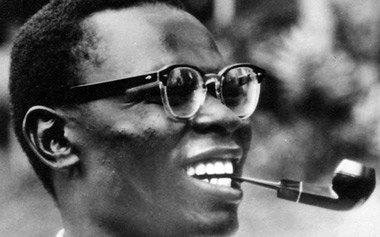While the headlines earlier this summer about Boston Globe journalist Sally Jacobs’s new book, The Other Barack: The Bold and Reckless Life of President Obama’s Father, focused on the startling revelation that the president’s parents might have considered putting him up for adoption, the real story lies in the extraordinary ascent—and downfall—of Barack Obama, Sr., a figure who made himself known to countless people in Kenya and the United States, yet until now remained largely shrouded in mystery.
As Jacobs notes early on in her book, the name Obama is derived from the Luo word ‘bam,’ which means ‘crooked.’ It is only fitting, then, that the paths the two Barack Obamas set out for themselves would be anything but straightforward. Both saw their stars rise quickly despite seemingly insurmountable circumstances, but while the younger Obama would go on to become the 44th president of the United States, his father’s life became a tangled web of lies, women, children and alcoholism.
President Obama openly wondered in his 1995 memoir, Dreams From My Father, about the relationship he could have had with the father he never knew. But now, for the first time, Jacobs fills in the holes of what she calls a ‘great untold story.’
Jacobs recently spoke about her book and the highlights of her research on the president’s enigmatic father.
Christina Marcos: What inspired you to write this book?
Sally Jacobs: When Obama was campaigning, there was very little known about Obama, Sr. And at the time, it seemed to me like this great, unknown story. So in the final weeks leading up to the 2008 election, I decided that if Obama won, I would pursue this larger story about his father.
What were some of the highlights of your research? And how long did it take you to complete it?
I spent a year and a half doing research for this book. I had never been to Africa before, and so I really enjoyed going to Nairobi, Victoria Falls and Kanyadhiang, the village Barack Obama, Sr. grew up in. I was also struck by the richness of his character and the way he left his mark in so many places and upon so many people.
What similarities do you see between President Obama and his father?
There are quite a few similarities. Clearly, they’re both exceptionally bright, and had the ambition to envision different lives for themselves. They also had what I suppose you could call the arrogance—or the hubris—to consider themselves worthy of higher positions. They were both extraordinarily intelligent and were able to accomplish so much. And they were also both very engaged in the politics of the day—Obama, Sr. cast himself as a key mediator in Kenyan politics, and had long-held ambitions of serving as an influential economist in the new Kenyan government.
How do you think they’re different?
Well, Obama, Sr. was a very heavy drinker, and had a very loose relationship with the truth. He impersonated his boss, told people he held a more important position than he actually did, and all the evidence shows that he just lied constantly to everyone. In contrast, whether or not you agree with his politics, President Obama seems like a profoundly rooted person, with a much more stable personality.
Do you know if President Obama has read the book? Do you think he’ll read it?
I would think he might want to, but I don’t know if he has. I believe that a copy has made its way to him, but I don’t know if he has read it. I requested an interview with the president for this book multiple times, but the White House turned it down each time. After I discovered the file that stated his parents may have considered putting him up for adoption, I met with [then-White House press secretary] Robert Gibbs for about 10 minutes, and he explained to me that the president wouldn’t comment due to the personal nature of the revelation.
What was your personal reaction when you discovered that file that stated his parents had considered putting him up for adoption?
Well, of course, I was very surprised. I only disclosed it to a few select people at first. But most of all, it really illustrated to me the profound role of chance in our lives. Just think—if he had been given up for adoption, the course of our country could have been completely different. We might have had a different president sitting in the Oval Office right now.
A lot of it seemed like fate, almost. You noted that Obama, Sr. left Kenya for the United States on Aug. 4, 1959—two years to the day before President Obama was born.
Yes, that really surprised me, too. That just shows you, again, how big the role of chance is in all of our lives.



